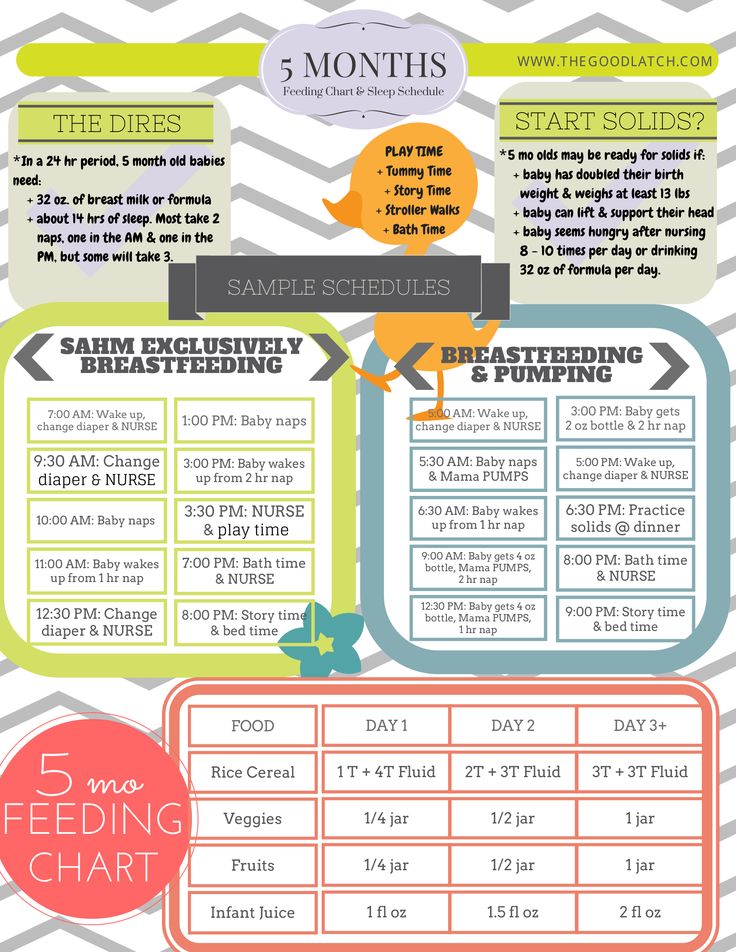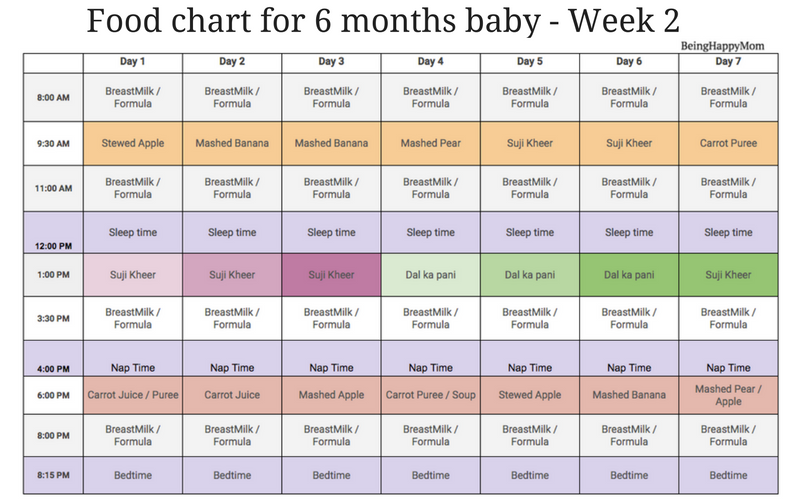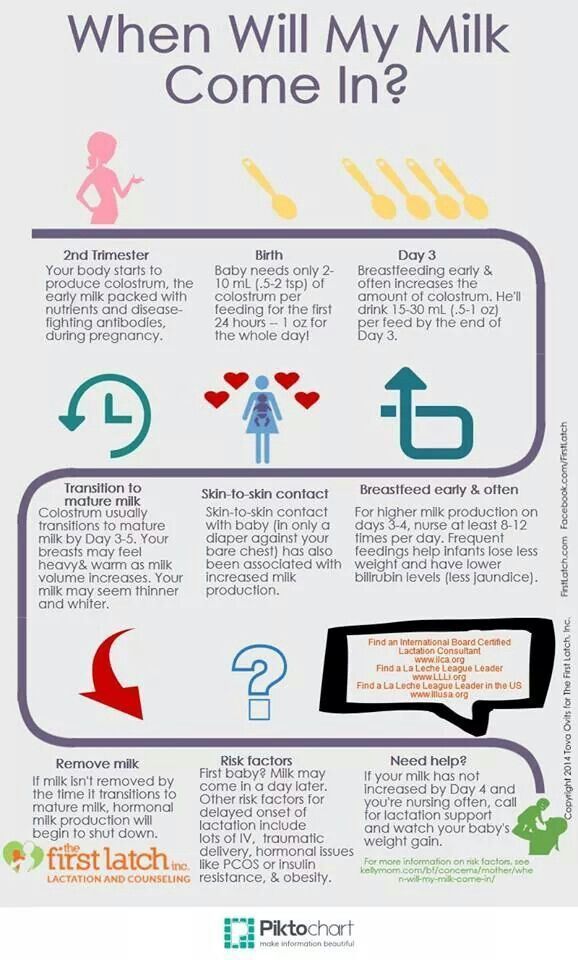Baby feeding and changing chart
Newborn and Baby Feeding Chart in the 1st Year
Whether you’re a first-time parent or a seasoned caregiver, figuring out why your baby is crying can feel like a guessing game. Fortunately, paying attention to your baby’s daily feeding schedule can help reduce some of the guesswork.
By following a feeding schedule, you might be able to avoid some of the fussiness associated with hunger, and you’ll be able to more easily tell whether he’s more likely to be wet or tired instead.
Whether your little one’s a newborn, a 6-month old, or even a 1-year-old, read on to find out how to come up with a feeding schedule and adjust it to your baby’s needs as he grows and develops.
Baby Feeding Chart at a Glance
As you watch for those delightful baby milestones — from first smiles and giggles to sitting and crawling — it can be hard to keep track of everything related to your baby’s feeding schedule. Fortunately, you don’t have to. We've assembled all the necessary details in the chart below, including feeding frequency and portion information.
Feeding Schedule for Breastfed Newborns
From the moment your baby is born, she begins to grow at a surprisingly quick pace. To fuel her development and keep her well fed, be prepared to nurse about every two to three hours.
By the time she’s a week old, your little one may begin to nap for longer periods, giving you more time between feedings. If she’s sleeping, you can maintain your baby’s feeding schedule by waking her up gently when it’s time to feed.
Tips to keep in in mind if you’re breastfeeding:
The length of time between feedings is measured from when your baby begins nursing, not when she stops.
Ensure your little one latches on properly. This can be difficult when you’re starting out, especially for first-time moms, but over time your baby may begin to latch comfortably.
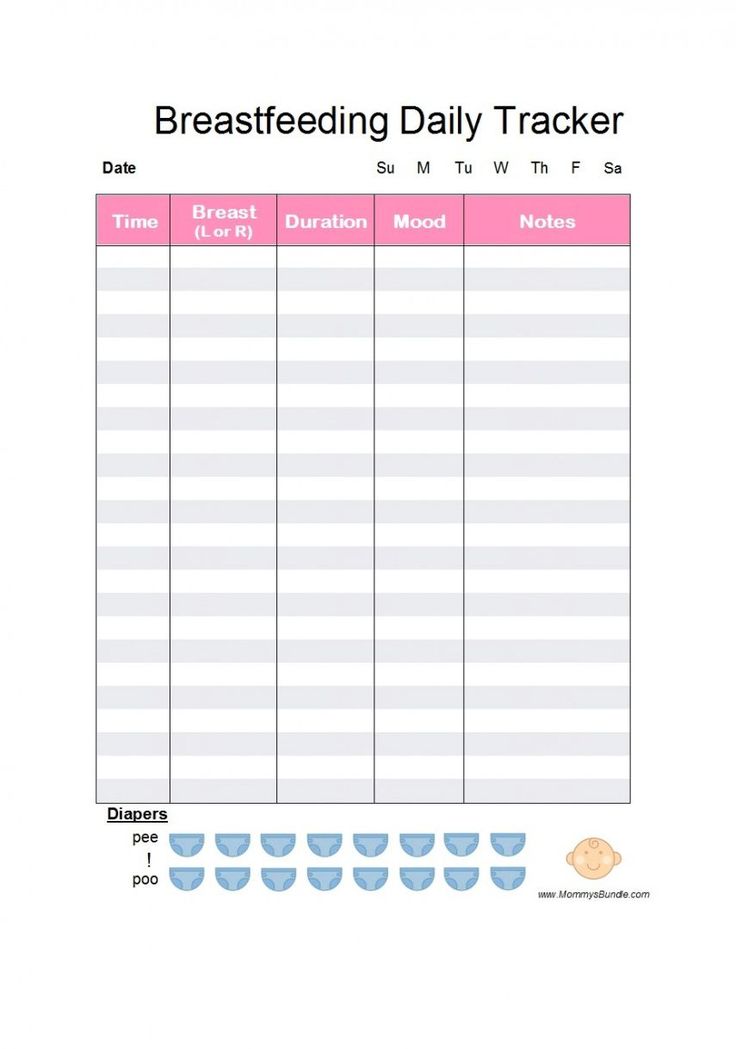 Speaking to a lactation consultant could be helpful.
Speaking to a lactation consultant could be helpful.As your baby grows she may nurse at a faster rate.
Alternate between breasts during each feeding.
Look for signs that your baby is full. She may turn away from the breast, nurse at a slower rate, or lose interest. Once she seems full, end the feeding
Your baby’s healthcare provider may recommend adding vitamin D oral supplements to your baby’s diet. Follow the provider's instructions to ensure your baby gets the proper dosage.
Nursing your baby on demand or every couple of hours around the clock can seem like a lot—and it is! At the newborn stage, your baby can’t take in much milk in a single sitting, so frequent feeding is needed to make sure she's getting enough. Later on, as your baby's daily routine (including her sleep and awake time) becomes more predictable, you'll have an easier time following a regular feeding schedule.
Feeding Schedule for Formula-Fed Newborns
Formula-fed newborns will need about two to three ounces (60 – 90 milliliters) of formula per feeding to start with.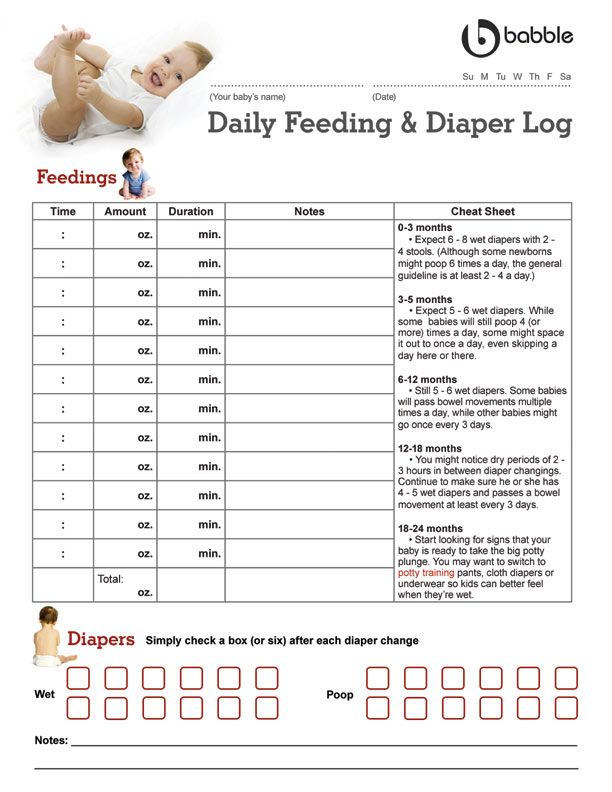 Newborns, fed from bottles are able to take in more during a feeding than a breastfed infants. This allows you to space out feedings by about three to four hours.
Newborns, fed from bottles are able to take in more during a feeding than a breastfed infants. This allows you to space out feedings by about three to four hours.
As your baby reaches her 1-month milestone, she will need at least four ounces per feeding to get the nourishment she requires. Your newborn’s feeding schedule will gradually become more predictable over time, and you’ll need to adjust the amount of formula as she grows.
3-Month-Old Feeding Schedule
Now that you and your baby have begun to develop a routine, it can be difficult to make slight alternations. However, as your baby grows and her feeding needs change, you’ll need to adjust your baby’s feeding schedule accordingly.
For Your Breastfed Baby
At 3 months, your baby is becoming more active, will begin to breastfeed less often, and may sleep for longer periods of time at night.
You may have to nurse just six to eight times per day at this stage (or about every three to four hours).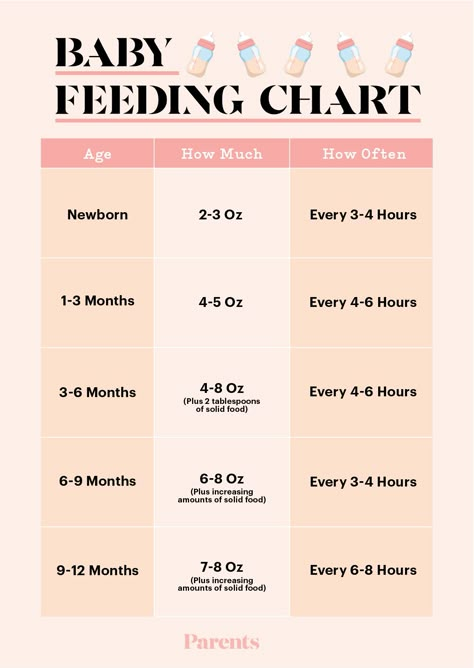
If your baby’s healthcare provider sees that he’s gaining weight and growing at a regular pace, then he’s probably getting the right amount of nutrition.
The number of wet and soiled diapers is also a great indicator as to whether or not he is eating well. Your baby should have about four to six wet diapers a day.
See your baby’s healthcare provider if you’re concerned that your little one may not be getting enough to eat.
For Your Formula-Fed Baby
As your little one continues to grow, you’ll notice that he wants to eat more during each feeding and begins to sleep for longer intervals at night.
Slight adjustments to your 3-month old’s feeding schedule may include:
Increasing the amount of formula to about 5 ounces per feeding
Giving your baby formula about six to eight times per day
Switching the newborn nipple size or style on your baby’s bottles to make it easier for him to drink from the bottle.
6-Month-Old Feeding Schedule
At this stage, your baby’s healthcare provider may recommend you expand your baby’s diet to include solid foods.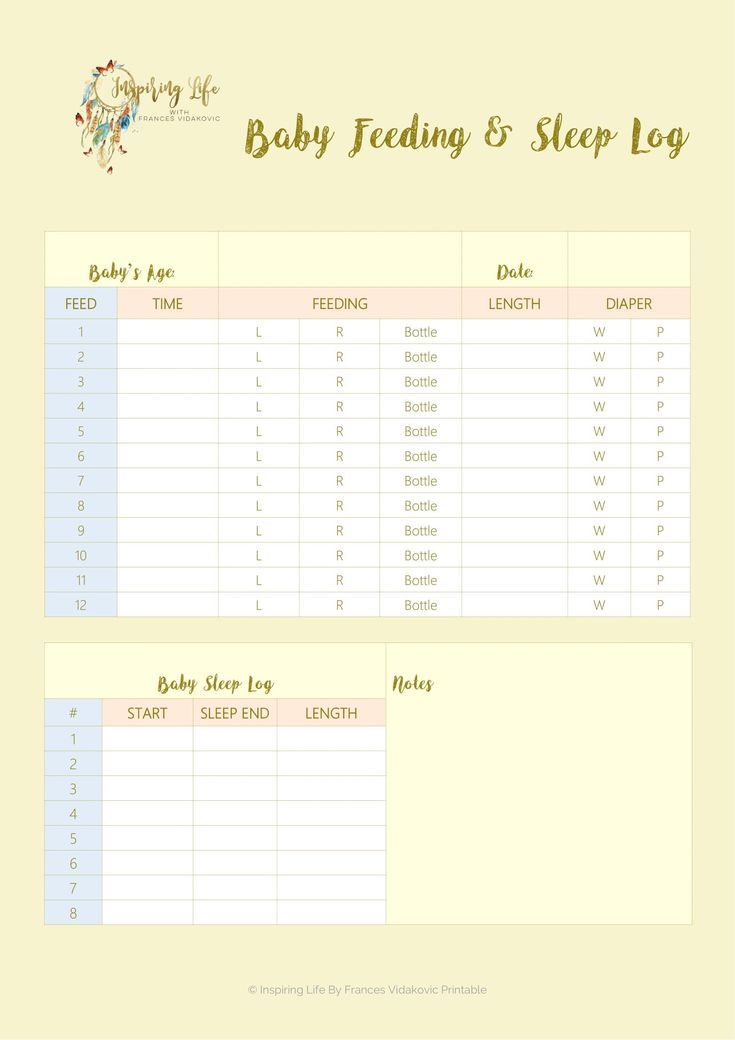 With these menu additions on the horizon, having a 6-month-old feeding schedule will come in handy!
With these menu additions on the horizon, having a 6-month-old feeding schedule will come in handy!
When a baby ready to try solid foods, a single grain baby cereal mixed with breast milk or formula has traditionally been the first solid food to be introduced, followed by pureed vegetables and fruits. However, there's no medical evidence that indicates introducing foods in any special order offers any benefits.
Keep in mind that solids are only a supplement at this stage, and that breast milk or formula is still your baby’s most important source of nutrition. Continue to include about 32 ounces of breast milk or formula in your 6-month-old’s feeding schedule of three to five feedings per day to ensure your baby gets the necessary vitamins and minerals.
You may be able to start weaning your baby off of night feedings; however, every baby is unique. Speak to your baby’s healthcare provider to see if it’s time to cut down on nighttime feedings and to learn what you can do to encourage the process.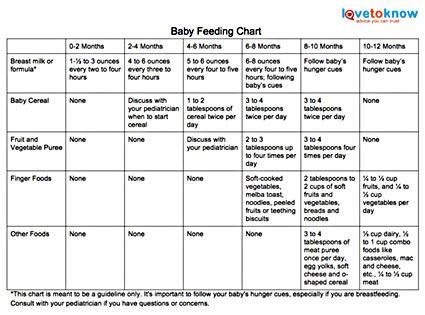
7 to 9-Month-Old Feeding Schedule
Months seven through nine can be a good time to add a greater variety and quantity of solid foods to your baby’s diet. He may need fewer daytime feedings, now — about four to five.
Purees of meats, veggies, and fruits are recommended at this stage. Introduce your baby to these new flavors as single ingredient purees then gradually add combinations to his meals.
Your baby may slowly begin to wean off breast milk or formula as his growing body demands solid foods for nutrition.
There is no correct time to wean off breast milk or formula. Speak to your baby’s healthcare provider to learn more about the cues and signs that can let you know when your baby is ready for more solid foods.
10 to 12-Month-Old Feeding Schedule
Exploring new textures may now be a big part of your little one’s meals. As he grows, he may begin to self-feed with finger foods such as cut-up bananas, dry cereal, and pasta and even demand certain flavors that he enjoys more.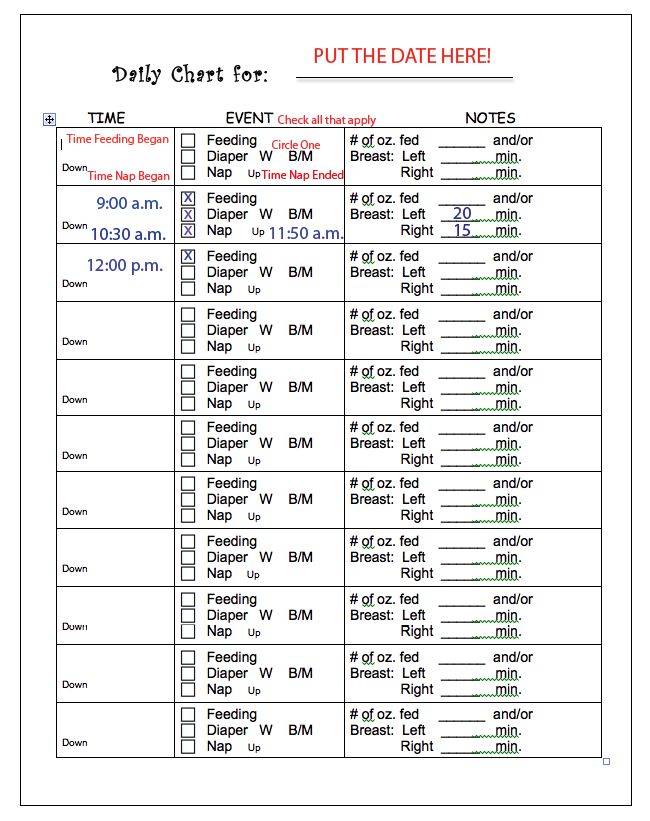
As you continue to replace breast milk or formula with solids, your baby’s healthcare provider can help determine how to balance out your baby’s meals.
Blends of different foods can be introduced during mealtime and added to your baby’s feeding schedule. Your baby may eat about three to four times per day. Be sure to avoid offering foods that pose choking hazards such as grapes, peanuts, and popcorn.
Finger feeding can be fun for your little one. Always be sure that his food is cut up into pieces that are small enough for him to be able to pick up and chew without being at risk of choking. After some practice, he’ll be on his way toward wholesome, independent eating habits.
1-Year-Old Feeding Schedule
Now that you’re celebrating your baby’s first birthday, it’s also time to celebrate his feeding accomplishments. Your baby’s feeding schedule can now include almost all the healthy and nutritious foods you eat, with a few minor exceptions such as raw honey and choking hazards like nuts.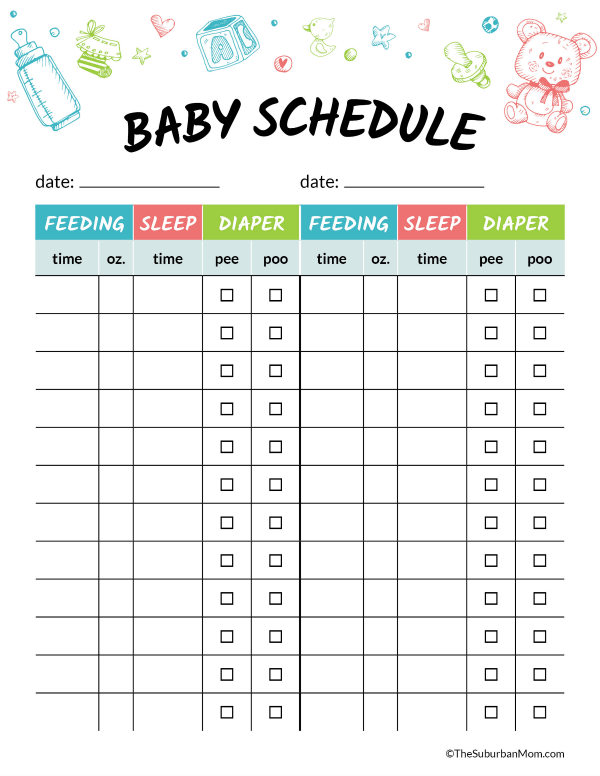
Your baby may be eating less frequently now, as he is able to take in more food in one sitting. Give your 1-year-old approximately three meals and about two or three snacks a day.
This is the time to add cow’s milk to your baby’s diet. However, too much milk is not always good, and should be kept to about 16 to 24 ounces per day if your baby is able to tolerate lactose. Check with your baby's healthcare provider if you have any questions about how and when to introduce cow's milk.
You can continue to nurse your baby if you wish. There is no correct time to wean him off of breast milk; rather, it is recommended that to continue breastfeeding for as long as it is right for you and your little one. Consult with your baby’s healthcare provider if you have questions about the weaning process.
As your baby grows and develops, his feeding needs will change. Having a baby feeding schedule at the ready can help you track your baby’s mealtimes and anticipate when he’ll start to be hungry.
This is just one of the ways you can help keep your little one happy and developing well. Having a feeding schedule in place also gives you some extra freedom to spend more time enjoying his many milestones.
Of course, if at any time you have questions or concerns, reach out to your baby’s healthcare provider for personalized guidance and advice.
Baby Feeding Chart - Etsy.de
Etsy is no longer supporting older versions of your web browser in order to ensure that user data remains secure. Please update to the latest version.
Take full advantage of our site features by enabling JavaScript.
Find something memorable, join a community doing good.
(210 relevant results)
child development from 0 to 1 month
03/01/2019
18
The long-awaited day has come and we finally arrived home with the baby from the maternity hospital.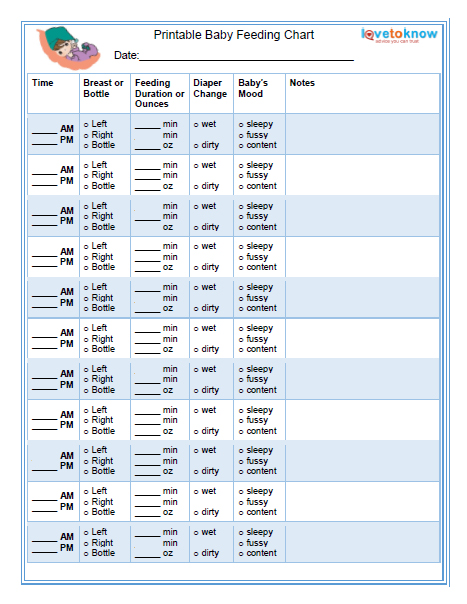 And now, in place of the hospital calmness, where everything seemed so clear, a wave of emotions swept over me. When and how often should I put him to bed? How to combine sleep and feeding from the first days? Should a child have a regime or should not organize a clear schedule?
And now, in place of the hospital calmness, where everything seemed so clear, a wave of emotions swept over me. When and how often should I put him to bed? How to combine sleep and feeding from the first days? Should a child have a regime or should not organize a clear schedule?
All the knowledge was in theory, but it was not easy to put it into practice. Therefore, I share recommendations that it is good for a young mother to know in order to survive such a difficult first month!
Baby's routine
Before we talk about baby's daily routine, it's useful to remember a few facts about sleep in babies this age: Yes, all children are different - some sleep more, others less. But in general, babies need to sleep about 16-18 hours a day.
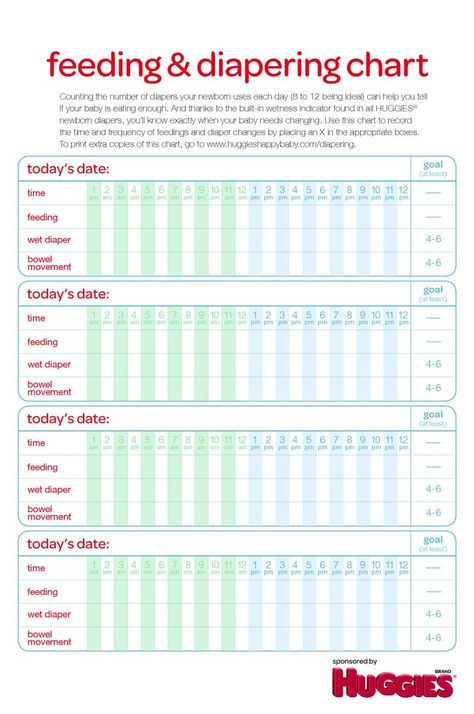 Therefore, all actions to organize the child's day regimen will be directed to this.
Therefore, all actions to organize the child's day regimen will be directed to this. Given these facts, it can be said that it is difficult to create a clear day schedule of 1 month.
Daytime sleep
Daytime dreams will not differ from nighttime. During the day, a newborn baby can sleep both 3-4 hours and 20-40 minutes in one dream.
The longest sleep period can be in a day.
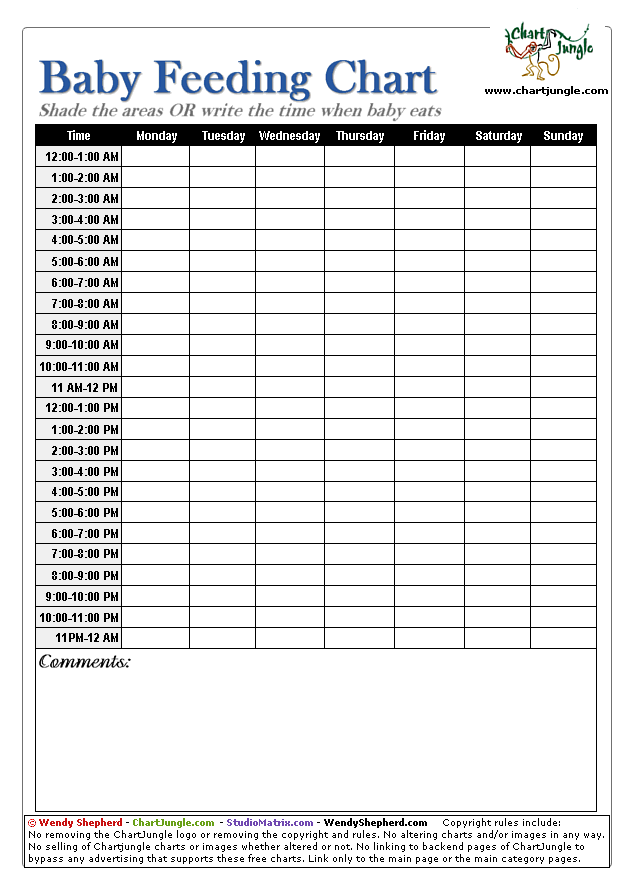
How do you know when a baby wants to sleep again? Focus on signs of fatigue in a child: if he rubs his eyes, looks at one point, sucks his thumb, then it's time for him to sleep. It is also recommended not to exceed the awake time for more than 50-60 minutes if the previous sleep was more than an hour. If the sleep was less than an hour, the period of activity of the crumbs will be the same amount of time. Overworking the child leads to long bedtimes, restless sleep at night and an incomprehensible daily routine.
Night sleep
Sleep can be about 7-10 hours at night. The baby will wake up for feeding. If in the evening your baby began to cry non-stop for several hours, it could be colic. The period of colic lasts up to 6-8 weeks. After feeding, hold the baby upright - this will help his digestion, do a light massage of the tummy.
If you suspect that crying is not related to colic, be sure to contact your doctor.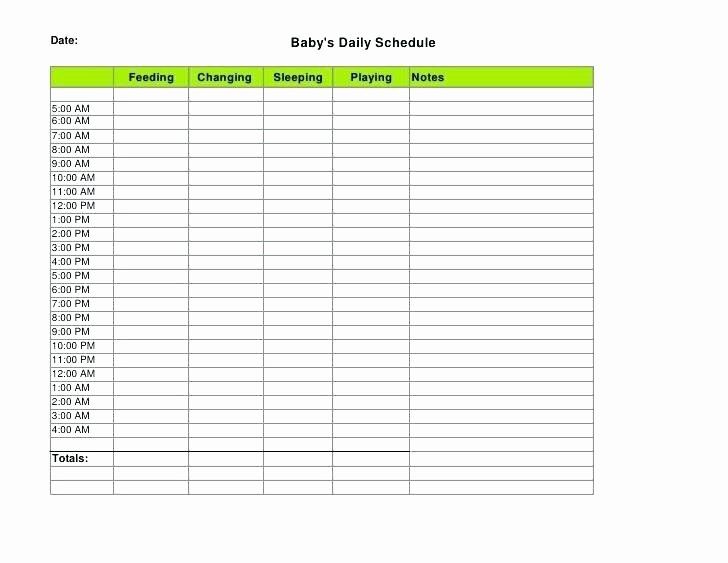 If you are formula feeding, talk to your pediatrician - it is possible that changing infant formula will improve the baby's condition.
If you are formula feeding, talk to your pediatrician - it is possible that changing infant formula will improve the baby's condition.
Confusion of day and night
Until 6-8 weeks of age, babies may confuse day and night due to an unformed biological clock.
Take your baby out to bright light during the day and dim the lights at home in the evening. Use a night light with a warm, low light at night during feedings and diaper changes.
How to make it clear to a child of 1 month of age that it is time to start the day or go to bed?
Rituals will come to the rescue - daily repeated actions after waking up or going to bed. In the morning it can be hygiene procedures, and in the evening - bathing, quiet games, swaddling and a lullaby.
Baby bed
For the prevention of SIDS (Sudden Infant Death Syndrome), certain rules are followed when organizing a baby bed.
-
Always place your newborn on their back.
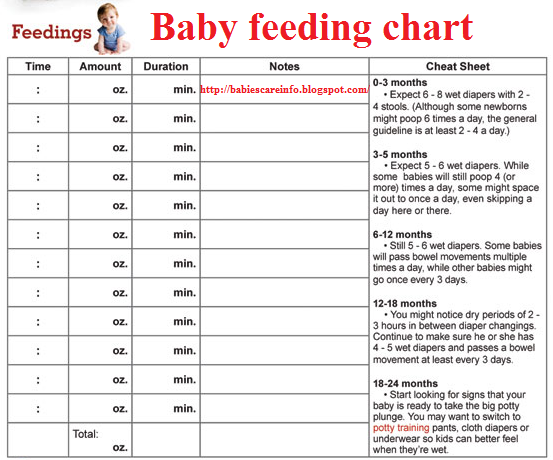 This is the safest position for a baby right now.
This is the safest position for a baby right now. -
Avoid overheating the baby - it is more dangerous for him than the cold. Therefore, pay attention to the temperature in the room: it should not exceed 21-23 degrees in winter and 25 degrees in summer.
-
The child needs to sleep on a flat, firm surface, without blankets, pillows, bumpers, toys or other things.
-
A separate nursery is not needed for up to six months, and sometimes up to a year - a crib in the parents' room is an ideal option for a child to relax. You can remove one wall of the crib and attach it to the bed of the parents. So the baby will be as close as possible to mom at night, but at the same time on a separate surface.
Tips to help your newborn sleep
Feeding your newborn
Feeding on demand is considered to be the best way to manage your newborn's diet.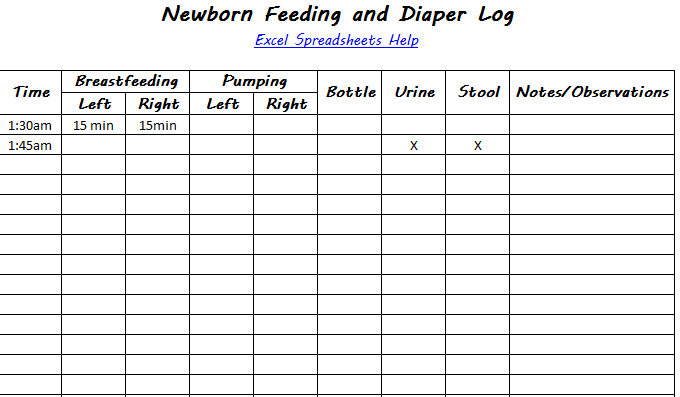
In the early days, breastfeed as often as possible. This stimulates milk production. We feed from 15 to 90 minutes. Prolonged feeding allows a newborn baby not only to satisfy hunger, but also to survive the stress after childbirth and get used to the new world. After the baby is likely to fall asleep. Night feedings are equally important for both the baby and the mother. They will mostly occur every 3-4 hours.
To improve lactation, also try to feed in the early hours of the night.
If a breastfed baby is eating well and gaining weight, he does not need additional food and fluids until 4-6 months of age.
Walking
An important part of the daily routine of a newborn this month. Walking outside helps set your baby's biological clock and improves sleep. You can walk with a healthy and full-term baby starting from the 10th day of life. Increase the time of outdoor walks gradually until the child is 1 year old, starting from 10 minutes in winter and 20 minutes in summer.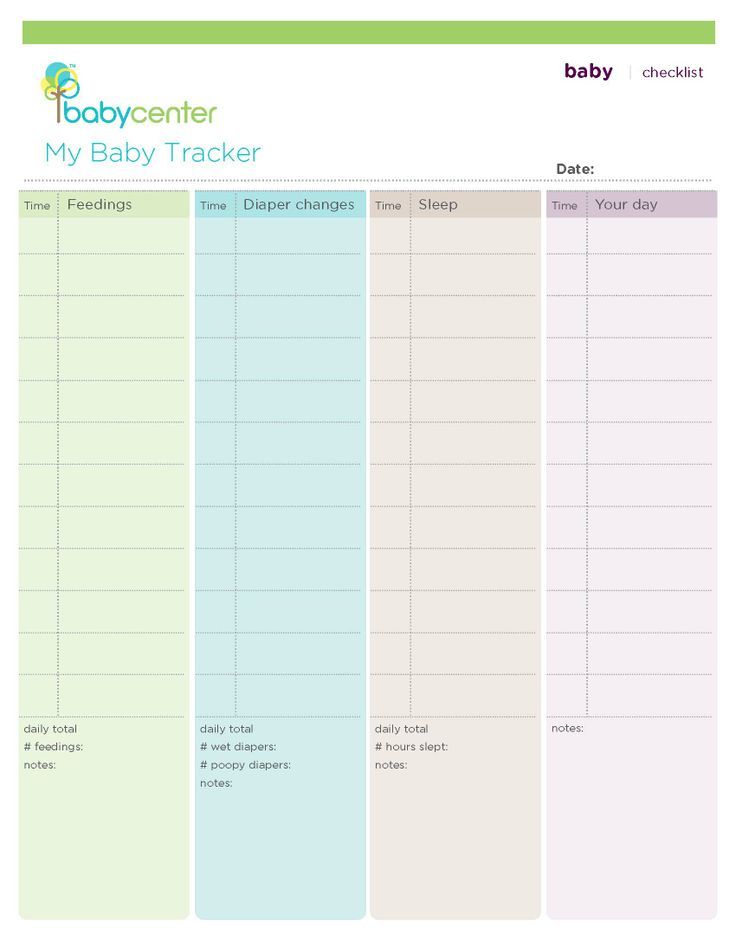
As you can see, in the first month the child's regimen is reduced to establishing a certain sequence of actions: sleep-wakefulness-feeding-games/walk, and there is no clear timetable yet.
Tell us, did you manage to organize sleep and feeding in the first weeks of your baby's life? What were the difficulties?
Like this article? Rate:
Votes: 291
newborn sleep and feeding schedule
02/26/2019
11
Your baby is almost 5 weeks old and do you remember how the first month was filled with new emotions, doubts and discoveries for you and your baby? But now you better understand your monthly baby and strive to organize a comfortable daily routine for your child. “What is important to consider at this age? How many hours of sleep and wake is enough for a child? How to properly organize the approximate regimen and feeding of a newborn this month? Frequently asked questions by new parents.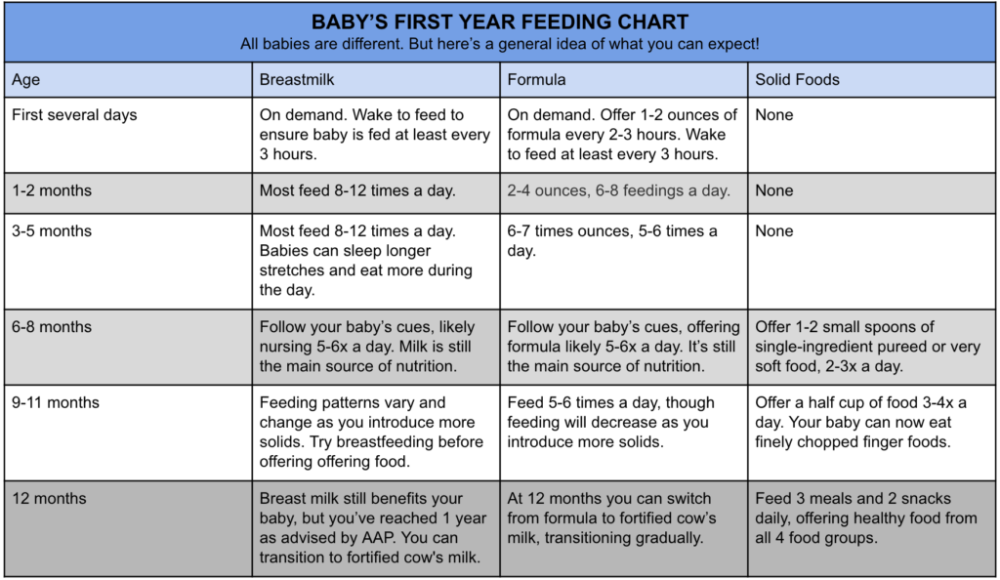 Let's explore them together!
Let's explore them together!
Baby's daily routine
1 month
In the first month of life, sleep is extremely important for the development of children, their growth and mood. Therefore, it is necessary to pay special attention to organizing the rest of the crumbs.
The baby sleeps approximately 17-20 hours a day. At the same time, some children of this age sleep more, others less.
Usually night sleep is 7-10 hours with awakenings for feeding, and daytime sleep is about 8-9 hours. With this mode, you will notice that the baby sleeps 4-6 times a day. It is important to remember that a newborn's daytime sleep can be both short (20-40 minutes) and long (up to 3 hours).
This is due to the fact that the brain of a newborn is not yet physiologically mature, the biological clock is not formed, so the child does not have any clear regimen. It turns out that you will not be able to achieve one schedule daily yet.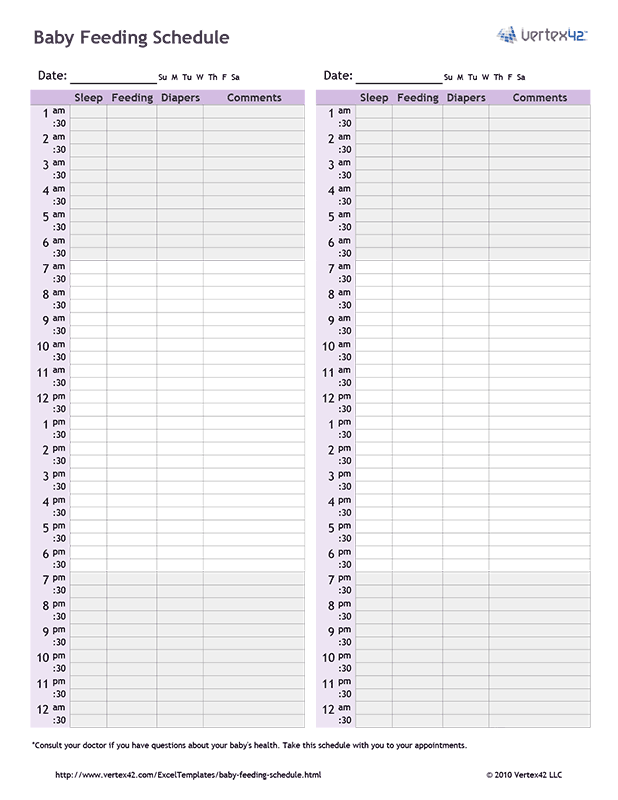 Also, leaving at night can change and be quite late. You will also notice that the baby during the rest gurgles, moves and does not seem to be actually sleeping. The fact is that now the child sleeps mainly in the fast phase, so now children's sleep is quite restless.
Also, leaving at night can change and be quite late. You will also notice that the baby during the rest gurgles, moves and does not seem to be actually sleeping. The fact is that now the child sleeps mainly in the fast phase, so now children's sleep is quite restless.
Waking time - is the second important point that should be taken into account when forming the routine of a month-old baby. On average, the baby should be awake for up to 60 minutes. Focus on the time that the child slept in the previous daytime sleep - as much as possible he can hold out in the state of wakefulness. This will also help organize the baby's routine this month.
Avoid overwork and watch your activity time between naps. Do not be afraid to soothe a newborn baby by any means.
What can be done to make the baby sleep better:
- Swaddle your baby so that he calms down faster and does not wake himself up with his arms and legs.
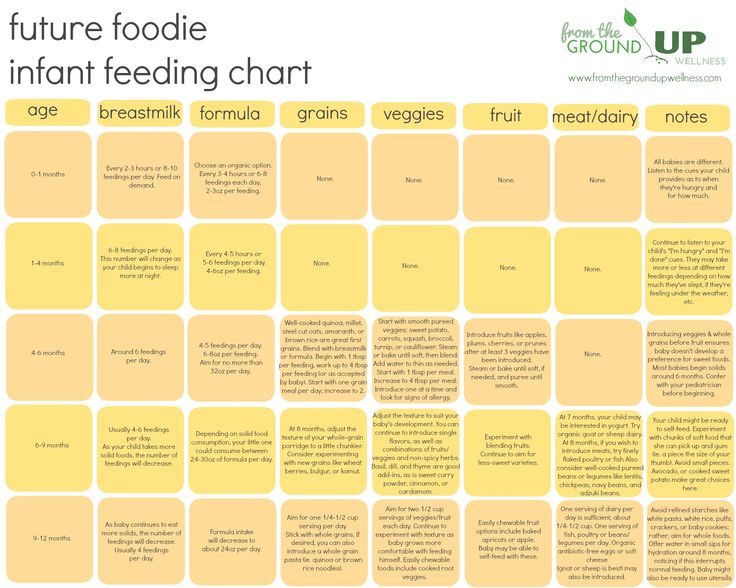
-
Organize sleep in your stroller. Babies tend to sleep longer outdoors. How long it takes to walk depends on the time of year. In summer it is possible up to 2-3 hours in a row, in winter - depending on weather conditions. If it's too cold outside, the best way out is to put the child on the balcony.
-
If the baby has difficulty falling asleep in the evening, dim the lights in advance, turn on white noise.
- Use a sling or chaise longue if the baby is completely capricious.
- Start bedtime when you see the first signs of tiredness in your baby - this is exactly the time when he wants to sleep.
- Be aware that changing your bed can wake up your baby. If you decide to transfer a sleeping baby from your arms to the crib, do it 20 minutes after falling asleep, when the baby is fast asleep.
- Bathe your baby before bed. Soon, bathing for him will be a signal to end the day and prepare for bed.
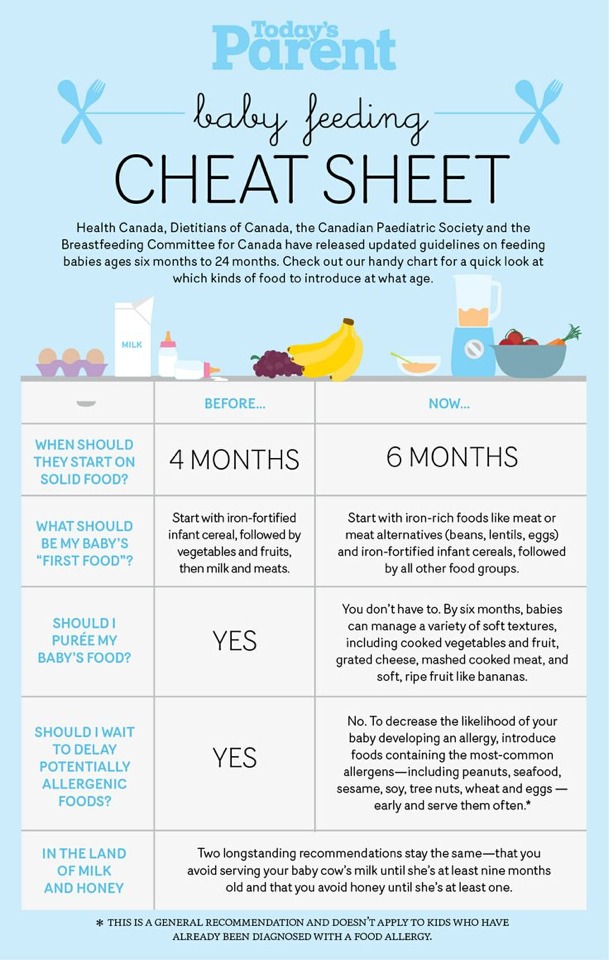
- Give your baby a pacifier if he can't sleep. Just remember that it is better to start using a pacifier when breastfeeding after lactation is established.
- Use a weak night light when feeding at night.
Causes of poor sleep in a 1 month old baby can be:
1. Physical discomfort. In the evening, the baby may begin an attack of colic, which lasts from 2 to 6 hours. Support the baby in every possible way on such days - by 6 weeks relief will come. Also remember that the baby takes over your state. A calm mother is a calm baby. Therefore, try not to forget about your rest too and do not worry if the regime is violated.
2. Confusion of day and night. Due to the not yet formed circadian rhythms, a 1-month-old baby may sleep more during the day than at night. But already by 1.5 months, the baby will begin to sleep at night for up to 3-5 hours in a row. Take your child out to bright light during the day and dim the lights at night.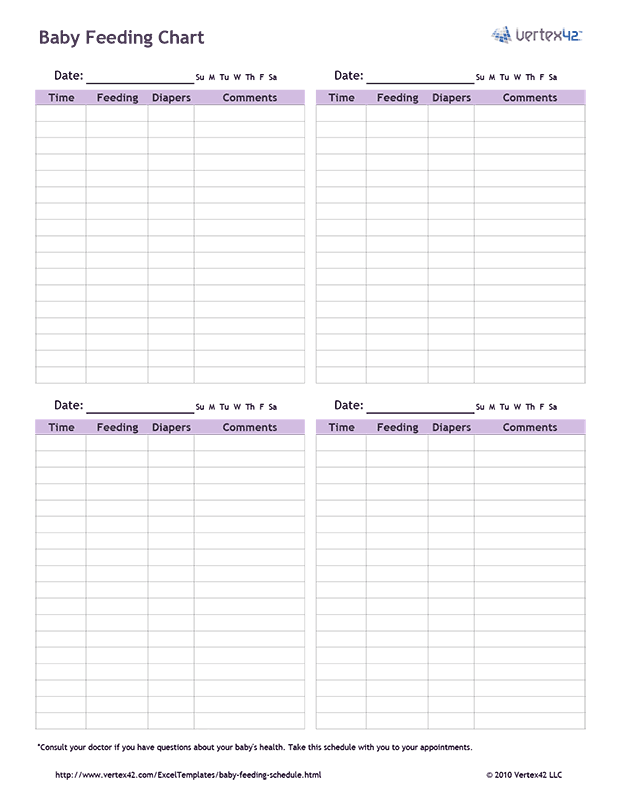 So the baby's body will quickly adjust the internal clock. Try to start the morning early so that the child understands that the day has come. Carrying out hygiene procedures will become for him an association with the morning.
So the baby's body will quickly adjust the internal clock. Try to start the morning early so that the child understands that the day has come. Carrying out hygiene procedures will become for him an association with the morning.
The table shows the baby's sleep norms for the first month of life:
Baby's feeding schedule
1 month
A newborn baby basically eats every 2-3 hours, regardless of the time of day. Therefore, do not worry if the child often wakes up at night now.
IV babies eat less often because formula takes longer to digest than breast milk.
Modern pediatricians advise in the first weeks of a child's life on breastfeeding to organize meals on demand in order to establish lactation. Night feeding also occurs on demand.
Gradually, you will learn to understand when the baby is hungry and asks for breasts. Also during this period, breasts are a way for children to satisfy the sucking reflex, calm down and relax.